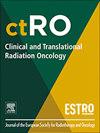Timeline of cognitive impairments after radiotherapy for head and neck cancer: A review
IF 2.7
3区 医学
Q3 ONCOLOGY
引用次数: 0
Abstract
Background
With advances in cancer treatments, long-term impairments of survivors have become more apparent. Radiotherapy of tumors in or near the brain can potentially induce cognitive impairments, impacting the quality of life of survivors. Currently, there is a lack of comprehensive information on the timeline of cognitive impairments following radiotherapy for head and neck cancer (HNC). To address this gap, we conducted a literature review on cognitive impairments observed after radiotherapy for HNC.
Methods
The literature review was conducted using PubMed, Web of Science, PsycINFO, and Google Scholar. Search terms included the following keywords: head and neck tumors, radiotherapy, treatment responses, cognitive impairments, as well as variants and related subcategories.
Result
Our review encompassed 23 studies involving a total of 1059 HNC patients, predominantly nasopharyngeal carcinoma. Overall, studies indicated a decline in cognitive performance post-radiotherapy compared to baseline scores, control groups, or normative data. The literature on acute effects is scarce and studies with complete neuropsychological assessments are missing. Cognitive impairments were prevalent in the majority of patients at six to 12 months post-radiotherapy, with memory deficits being the most prominent. Long-term assessments demonstrated that these cognitive deficits persisted even beyond seven years, suggesting a potentially irreversible decline in cognition following radiotherapy.
Conclusion
Cognitive impairments are frequently observed at least six months after radiotherapy. Standardized cognitive assessments are imperative to evaluate impairments in individual patients. Future research in HNC should integrate neuropsychological evaluations to enhance our understanding of domain-specific impairments and the complete timeline of cognitive changes after radiotherapy.

头颈癌放疗后认知损伤的时间轴:综述
随着癌症治疗的进步,幸存者的长期损伤已经变得更加明显。脑内或脑附近肿瘤的放射治疗可能诱发认知障碍,影响幸存者的生活质量。目前,关于头颈癌(HNC)放疗后认知损伤的时间线缺乏全面的信息。为了弥补这一空白,我们对HNC放疗后观察到的认知障碍进行了文献回顾。方法采用PubMed、Web of Science、PsycINFO、b谷歌Scholar进行文献综述。搜索词包括以下关键词:头颈部肿瘤,放疗,治疗反应,认知障碍,以及变体和相关子类。结果本综述纳入23项研究,共1059例HNC患者,主要为鼻咽癌。总的来说,研究表明,与基线评分、对照组或规范数据相比,放疗后的认知表现有所下降。关于急性效应的文献很少,缺乏完整的神经心理学评估的研究。大多数患者在放疗后6至12个月普遍存在认知障碍,其中记忆缺陷最为突出。长期评估表明,这些认知缺陷甚至持续超过7年,表明放射治疗后认知能力可能出现不可逆转的下降。结论放疗后至少6个月出现认知功能障碍。标准化的认知评估对于评估个体患者的损伤是必要的。未来HNC的研究应结合神经心理学评估,以增强我们对特定领域损伤的理解和放疗后认知变化的完整时间线。
本文章由计算机程序翻译,如有差异,请以英文原文为准。
求助全文
约1分钟内获得全文
求助全文
来源期刊

Clinical and Translational Radiation Oncology
Medicine-Radiology, Nuclear Medicine and Imaging
CiteScore
5.30
自引率
3.20%
发文量
114
审稿时长
40 days
 求助内容:
求助内容: 应助结果提醒方式:
应助结果提醒方式:


